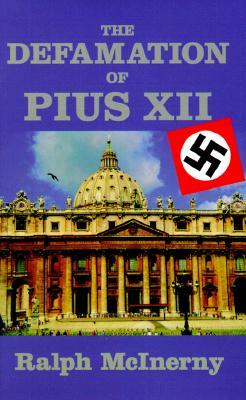The Defamation of Pius XII recounts the heroic efforts of Pope Pius XII and members of the European Catholic hierarchy, clergy, religious, and laity to save hundreds of thousands of Jews from Hitler’s “final solution.” Pius XII began this work before the outbreak of World War II and continued it throughout the war years. It was part of a larger program, initiated by Pope Pius XI, to safeguard the dignity of the human person from “the usurpation of every human and divine right” (New York Times, October 30, 1939) by the totalitarian states of Mussolini, Hitler, and Stalin.
The Pope’s words form part of the foundation for similar efforts made by the present pontiff against world government and global business. The Catholic Church alone, as Albert Einstein wrote in 1940, repeatedly protested against the policies and actions of the Third Reich. Following the war, the entire world praised Pius XII and the Church for the sacrifices made to save, by some estimates, nearly one million Jews from the death camps.
Ralph McInerny’s thesis is that the present-day false accusations against Pius XII are really attacks against the Catholic Church, and a compelling case can be made for this argument. Stalin tried identical tactics immediately after the war, as he worked for control of Eastern Europe. The logic then, as it is now, was to raise questions in the minds of the faithful: If the Roman Catholic Church had a hand in the horrors brought on by Hitler, how could it be trusted today? The Catholic Church was the sole obstacle to Stalin’s aggression in Eastern Europe. Speaking through Izvestia, Stalin employed the hierarchy of the Russian Orthodox Church to point accusatory fingers at the Pope, charging him with everything from beginning the war and cooperating with Hitler to plotting the takeover of the world. Everyone, including the New York Times, knew the charges to be rubbish (New York Times, April 17,1945). The first published mention of the false charge that the Pope had been silent about the “final solution” was made after his death in 1958, when the communist paper L’Humanite wrote that the Pope should be criticized “for not having taken a stand against the Nazi concentration camps during the war.” Rolf Hochhuth’s play The Deputy, written in the early 1960’s, gave the false accusations a worldwide airing. Today, the media attack the Church by attacking Pius XII in accordance with the same logic: undermine the Church’s credibility by accusing it of complicity in horrific crimes against humanity during World War II, as well as of participation in the mythological atrocities of the Crusades, the conquest of the Americas, and every other politically incorrect event in Western history.
Dr. McInerny’s book presents the conclusions made by other authors about Pius XII. He quotes my work on Pius XII as reported by the New York Times, but without crediting it. He uses no primary historical texts, principally relying instead on quotations and research from other books, such as Pius XII and the Second World War by Pierre Blet, S.J., and The Last Three Popes and the Jews by Pinchas Lapide. He has done little (if any) original work or real synthesis, and his book is too hurriedly composed to be considered scholarship. The Defamation of Pius XII is similar in style to a fundamentalist Christian pamphlet, decrying in shrill terms the fallacies put forth by the enemy camp. His facts are correct, but his style and approach are disconcerting.
I wish that Dr. McInerny had presented his argument in a more balanced and scholarly fashion, while using some primary texts to defend the only man who stood up to both Hitler and Stalin.
[The Defamation of Pius XII, by Ralph McInerny (South Bend, IN: St. Augustine’s Press) 211 pp., $19.00]

Leave a Reply